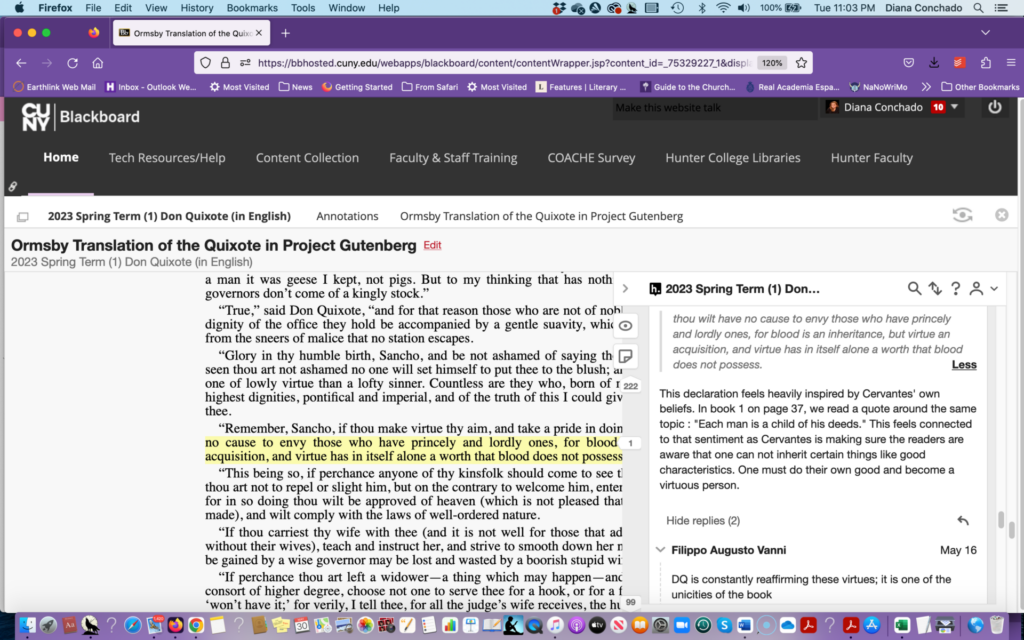A little more about your class:
I taught SPAN 265/CompLit 380.96 which is Don Quixote, in English. It was an in-person undergraduate course for students who are not Spanish majors. Most of them were not literature students, had little experience with literature, and said they had registered for it because it fit nicely in their schedule. Their majors were diverse (CSCI, PoliSci, Health Sciences, Psych, etc).
The issue you’re addressing:
I wanted to make sure that ALL of these students were able to engage with this very long, very old book in a way that was meaningful to them. I wanted them to keep up with the extensive reading and make this classic work of literature their own, so that, hopefully, it would, in time, become a good friend.
Tell us a bit more about your teaching innovation:
I pretty much discarded all my usual ways of doing things, especially assessments. I wanted students to have more agency in terms of what they were learning and how they were evaluated. The students and I collaborated on what types of projects they would do. Instead of a midterm exam, students worked in pairs to define the main themes they identified in Book I. They then worked in Hypothesis to annotate the parts of Book I where they saw the themes they had identified articulated. I think this was much more valuable to them than an exam, and it provided a good review of Book I as they began reading Book II. For the term paper, they were given the option to do a different sort of project instead. Most did write essays, although quite diverse in nature, and quite a few wrote some very compelling creative pieces. For the final exam, the students and I each submitted three questions, and then the students voted on the top ten questions. These were the themes that would be studied for the final. In this way, students were given space with which to draw from Cervantes’ novel the ideas that seemed most meaningful to them, instead of solely following my prompts. While I tried to make sure they kept on pace with entry tickets and Mentimeter exercises that asked questions about the day’s reading (and these were my prompts), students posted weekly questions on BlackBoard about issues they had wondered about during the week’s readings. So, here again, I tried to balance what I wanted to highlight for them with what they themselves were focusing on and thinking about, so that Cervantes’ great novel would become theirs.

Your initial takeaways:
In a midterm survey, students expressed satisfaction with the class discussions and assignments. They said they felt comfortable expressing their ideas in class and enjoyed our conversations. I think that the options they had–the fact that we discussed how we were going to do everything–made them feel we were all in it together–which we were, of course. I was also very honest with them about how some of these innovations made me feel (a bit uneasy, admittedly). It was a memorable semester for me; I grew from the experience of changing my ways in the classroom, but I also learned a lot from this group of students who were willing and enthusiastic partners. In his final exam, one student wrote very candidly about an episode in the Quixote and how it related to his life, his intimacy. I was very moved to read his words not only because they reflected how much reading the novel meant to him, but because he felt comfortable enough to share his very private insights with me. It was a privilege and a joy to share this profound work with these inspiring students.
Suggested “podcast pairing”:
Joe Hirsch on “Moving from Feedback to Feedforward” (The Cult of Pedagogy podcast)
Cate Denial on “A Pedagogy of Kindness” (Teaching in Higher Ed podcast)
Bonnie Moon and Robert Eaton on “Improving Learning and Mental Health” (Tea for Teaching podcast)

